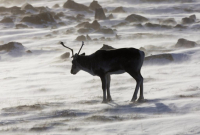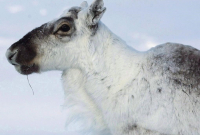Support strong Canadian climate journalism for 2025
On a cold morning in February, dedicated elementary students gathered lichen for caribou who live in the Revelstoke maternity pen. They were told these actions are creating hope for the future — they were lied to. There is no hope for caribou or other species that need lichen-bearing old-growth forests in this caribou planning unit or beyond if our current actions don’t change. And there’s no reason to believe that change is coming.
Having failed to protect caribou habitat over consecutive decades in British Columbia, the province and federal governments released a draft Bilateral Conservation Agreement for Southern Mountain Caribou in British Columbia on March 21. The draft agreement garnered headlines that this new deal “could render wolf and cougar culls unnecessary.” However, nowhere in the plan is there any mention of an end to the killing programs underway. Instead, the draft commits to “continue to conduct wolf control via ground and air-based methods” in the two zones where it is already happening (South Peace and Revelstoke-Shuswap) and considers expanding the wolf kill program further north.
The draft commits to wolf-kill programs for at least another two years (until 2021), extending the tax-funded “5-year wolf kill experiment” that was supposed to end this winter, and which has not been evaluated by the province.

Most ten-year-olds understand that the single most important thing that an animal needs to survive is habitat. While we gather lichen from trees to feed caribou, the forests these animals rely on for survival are being decimated, along with countless other species that inhabit these unique ecosystems.
Many caribou herds in the Southern Group are considered “deep snow caribou,” feeding on arboreal lichen that grows on trees well over 100 years old. Alongside the lichen collection program for the maternity pen in the Revelstoke-Shuswap caribou planning unit, logging companies continue to cut down ancient lichen-bearing trees across the province while the government proposes to learn more and plan more. Recommendations include radio-collaring wolves, moose and caribou, despite the added stress and risks this places on animals. Additionally, all non-caribou members of the deer family are being killed en-masse through liberalized hunting quotas designed to favour caribou in the zoo we are creating for them.
The continued destruction of caribou homes might come as a surprise, since maternity pens should be used only as part of a last effort to save a species, and only in instances where all other recovery options have been exhausted. But, aside from killing wolves and other animals, building the fenced maternity pen is about the only effort happening on the ground to recover caribou. This doesn’t change the fact that caribou need old forests, not fences. Old-growth forests take more than a century to re-establish under the best conditions.
To even hope for, let alone ensure, that caribou can survive and recover, critical habitat protection and restoration of old logging roads are necessary. Neither have happened. One "Action Planned" in the draft is to continue to seek funding to contribute to habitat restoration projects, yet with ongoing logging in caribou habitat this step is somewhat ridiculous. We’ll need to fence caribou and kill wolves for the next century to keep a handful of caribou on the land.
The remaining ancient forests are deserving of their own protection — they are home to myriad unique species and ecological processes. Protection plans for caribou have only focused on the species as a single thread, ignoring the natural loom and fabric that make caribou what they are. As it stands now, 5 different companies will be logging in caribou habitat in the Revelstoke-Shuswap Planning Unit until 2022. There’s no reason to believe that will stop when permits run out — they’ve been renewed despite decades of caribou declines.
Meanwhile, wolves are being shot from helicopters in this region with no professional oversight to prevent suffering, moose are being killed in order to reduce predators, and caribou from now-extinct herds are being helicoptered into a fenced maternity pen. If it weren’t so sad and if the consequences weren’t species extinction, it would be laughable. If Canada — a comparably rich and well-educated country — won’t prioritize the preservation of species, how can we ask or expect others to do so? Going one step further, is it any wonder that the lack of respect shown to nature and the violence condoned by governments towards wildlife and ecosystems has led to archaic killing contests in B.C. and attitudes of domination over nature?
I question the rationale that maternity pens are used for re-introduction of caribou into the wild when it’s clear there will be little to no wild left to sustain caribou. All that is being accomplished is a carnivore cleansing program and a caribou zoo. I do not want my taxes funding this unjust and inhumane conservation hoax. Do you?





Comments
Good for Ms Parr!
However, she is too polite and does not go far enough. For instance her "carnivore cleansing program" is really a murder program, and IMO, she should so state. And, in her last summary paragraph there is no mention that Moose and other ungulates suffer under a similar plan.
It seems to me that the real problem here is the curse of continued tree killing (some call it logging). If the government cared about Caribou, all tree killing in Caribou habitat, or potential Caribou habitat would be stopped today.
Parr concludes " I do not want my taxes funding this unjust and inhumane conservation hoax." The article is a great expose but in her conclusion she is attacking the wrong end of the problem. To remove funding for maternity pens -- arguably a strategy of last resort -- because of habitat destruction, to my mind, seals the fate of caribou populations in Canada. Her justifiable concern should be focused on ways we might stop persistent logging of old growth forests. What about legal protections? I worry that a certain readership will latch onto her final statement.
Another article bringing to our attention the fact that humans are destroying the habitats of fellow earth dwellers, while not realizing that it's our habit that we're destroying as well. It's sad that we're destroying the wealth of our home that biodiversity is. It's tragic and ironic that we're consuming ourselves into extinction with our eyes wide open.
Whatever other "remediation" techniques the government toys with to pretend to save the caribou, it will not for one minute consider restricting the scything down of old growth forests.
Mass slaughtering of wolves will not work; they know it won't work.
Maintaining maternity pens will not work; they know they won't work.
But after most of the dwindling caribou herds in the interior have been extirpated, the Minister of Forests and Everything will make an announcement with grave sincerity about this "regrettable outcome" that has occurred in spite of his government's best efforts and sorrowfully maintain how "everything possible was done" by the ministry's conservation experts to prevent it. But on the upside, they will be saving taxpayers dollars on preparing more Caribou Recovery Show reports with all those pictures and charts!
https://www.for.gov.bc.ca/ftp/HTH/external/!publish/Caribou%20Recovery%…